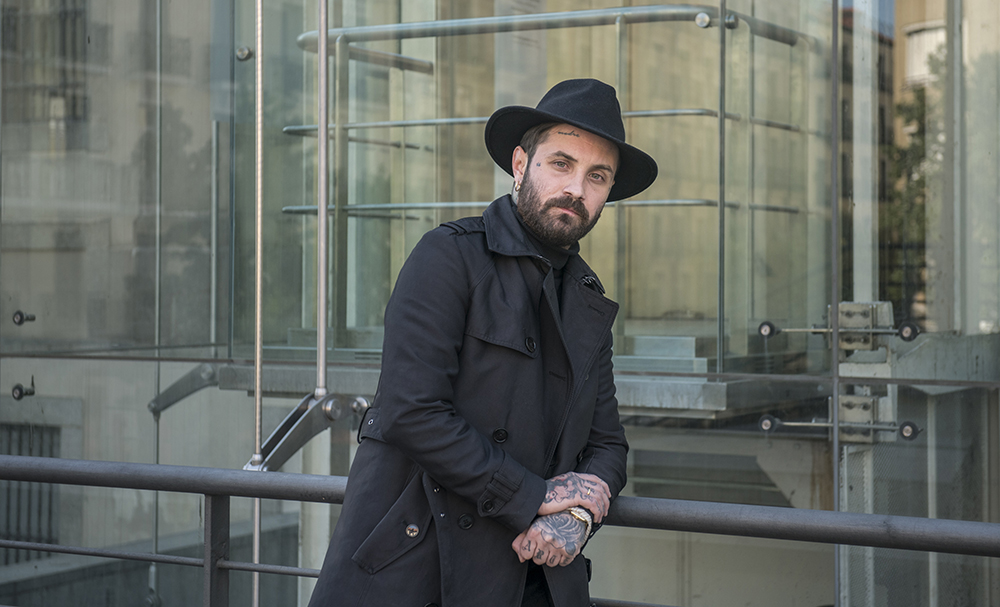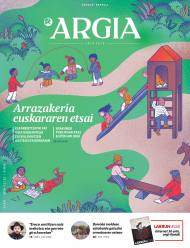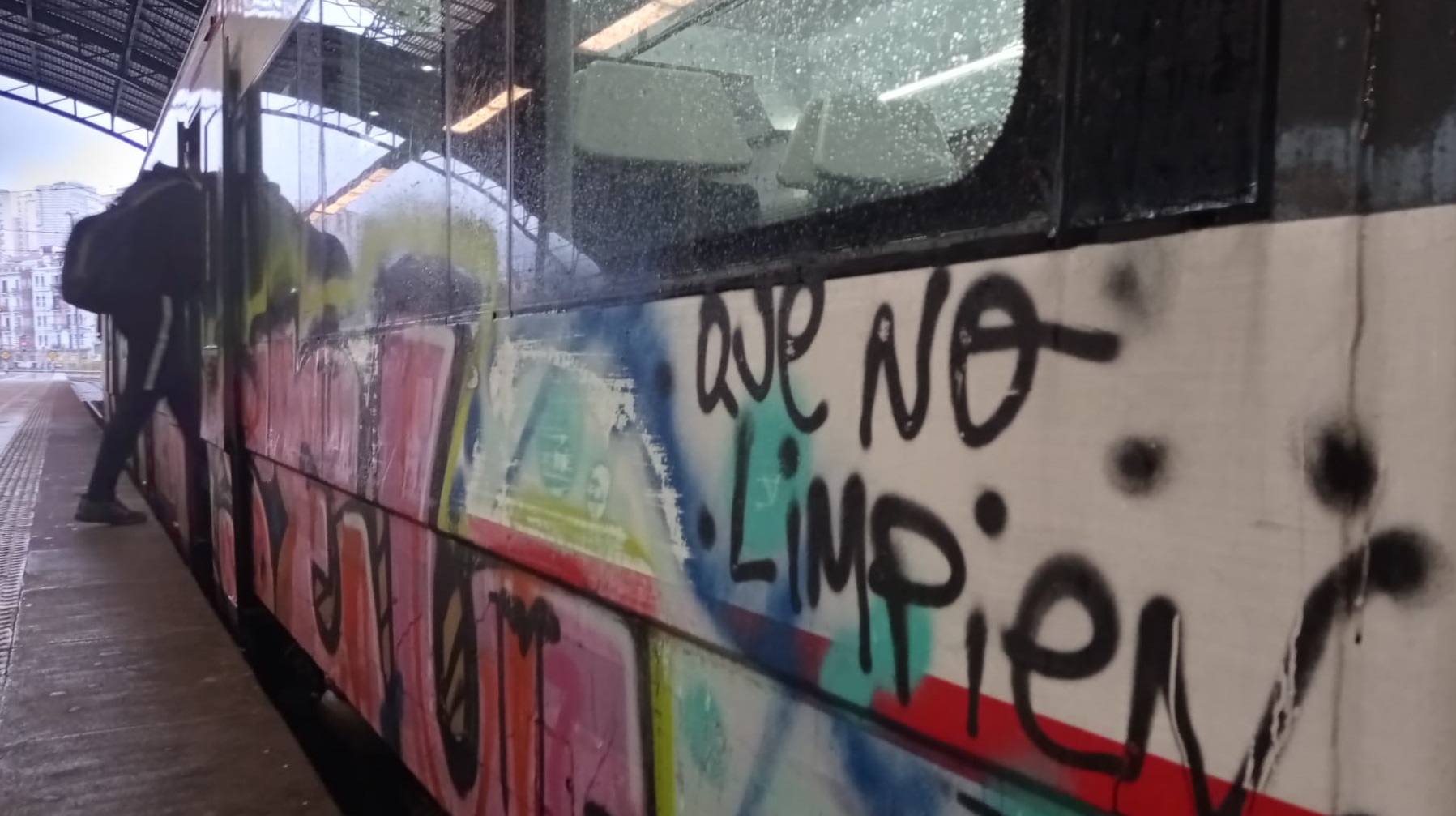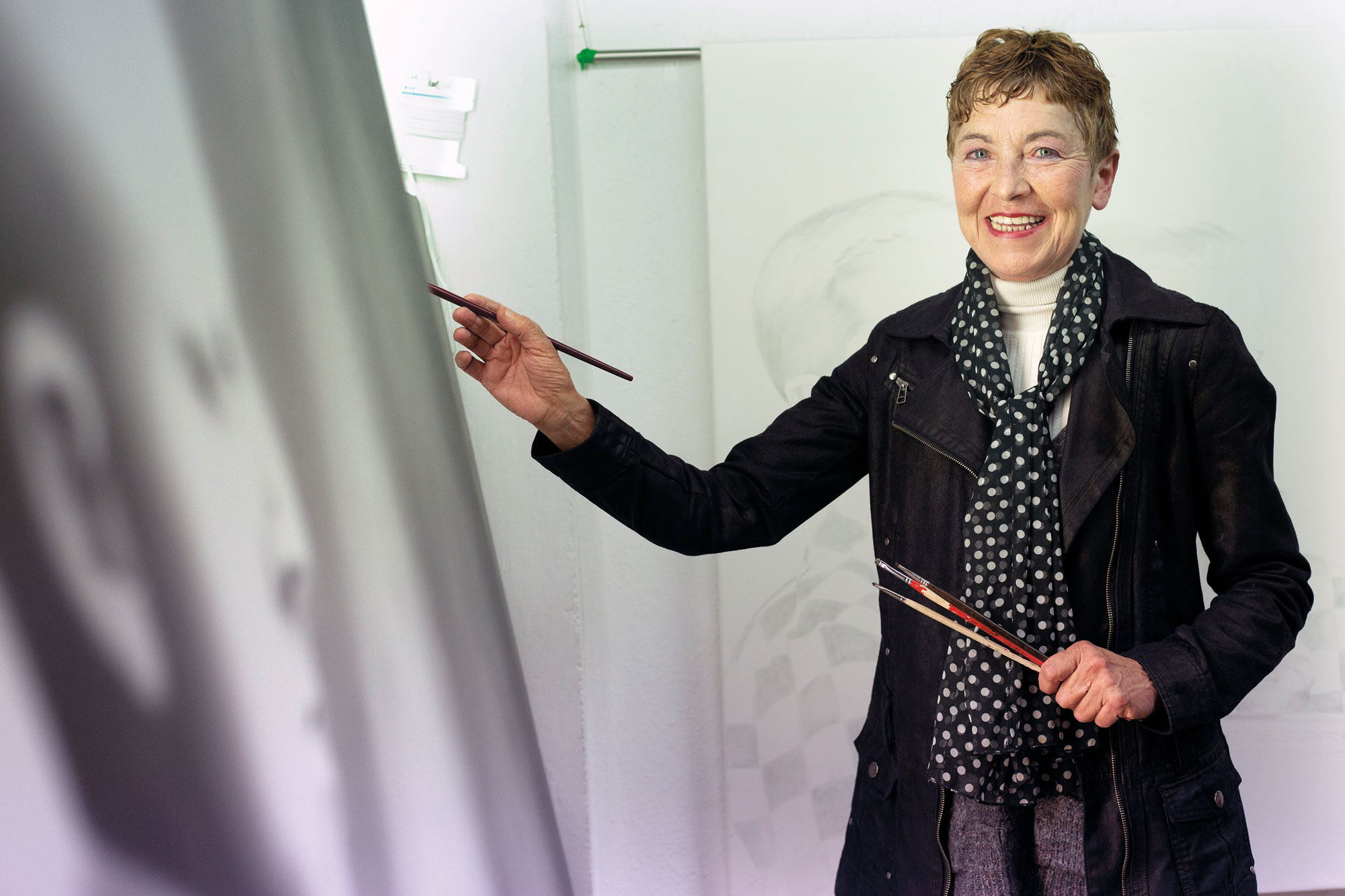"I feel comfortable in this environment of threats and hatred, more comfortable than when they congratulate me"
- Abel Azcona, the son of a drug-addicted and prostitute woman who tried to abort, claims that she should not have been born. He makes an art derived from his life and his wounds and thinks about his death: it will be an art piece. The author of controversial and censored works, in a performance held in Pamplona/Iruña, denounced the pederastia approved for years within the Catholic Church, and has been summoned to testify for a crime of hatred against religious feelings. He has preferred to disobey and exile Lisbon, although he says that he will be arrested sooner or later.

Abel's mother, 32, was born in 1988 in a clinic in Madrid for patients in situations of exclusion, where she abandoned her son. The couple of the woman at the time picked up the little one and took him to Pamplona. He grew up in Pamplona and was later adopted by an ultracatonic family in Pamplona. He has addressed uncomfortable issues related to his biography in artistic acts (sexual abuse, drugs, pain…) and other issues (occupied Palestinian territories, refugees, missing from the 1936 War…). He has published numerous books and has shown in more than 80 countries artistic works that leave no one indifferent: he has eaten koran leaves; he has laid bare in the gallery and has asked the public to do whatever he wishes with his body; he has sat in front of a loaded pistol, declaring to the collectives that they have threatened to shoot him; he has written the word "pederastia" using consecrated harasses;
You have said that you had a addictive mother and a prostitute who forced you to have a child (yourself), that after birth you have suffered marginalization, ill-treatment, mental problems, suicide attempts… The tone of these hard life experiences is noted among you.
I live with that heritage and backpack and in my work I take a position according to it. What I do has to do with sex, with exclusion, with a lot of wounds that are part of my life, because it's a way to analyze my story. I was adopted at the age of seven, and that adoption was the forgetting of my previous life, until at 17, I decided to repeat the patterns of my previous life to understand those processes. My bond with my mother was heroin and prostitution, and I had to repeat it. Some of the works have helped me to get to know me better, have had a cathartic basis, but others have made the situation worse. Projects related to prostitution, for example, have been painful experiences.
Your art has a lot of denunciation. On issues such as paedophilia, religious fundamentalism and drugs, many taboos have been put on the table. When
I started the processes, I've done it from a selfish attitude, driven by that need to analyze my inner life, but it's also true that in a taboo society, I've worked on uncomfortable issues. The Spanish state has no capacity to deal with memory, memory in all its variants, and when I have been able to explore my memory and take it out, to metaphorically undress me and literally, I have achieved a certain balance with myself. Spain does not and all the crap stays at home, it is a country full of taboos, which keeps many personal stories secret.
I think the artist has to be honest, he has to express what you are and what you feel, and in my case I work with my life story. What have I said too much? Well, I've already put everything in sight, but I don't regret it.
"I was forced to be born and I will decide when this life will end. And it will be a gift, because when you accumulate mental illness and a lot of work, it's a gift."
You say that taking all of that has served you to achieve balance, but some of your art projects seem very self-destructive.
Yes, but for me that is balance, my balance. I have to deal with many mental illnesses and many personal injuries every day and I have learned to find the balance within that destructive wave. If I don't do it artistically, I would do it otherwise, because it's my way of understanding life and death. I was forced to be born, and I'll decide when this life will end, and that's also going to start and make you understand a lot of ideas that I have in my head.
It serves to balance you. The viewer? For
me it's a performance to open a suitcase, but open it to the public rather than open it at home, and from the moment you become a collective process, people will help you to open some pockets of the suitcase; from that mutual action I learn from those people who come with their own suitcase and backpack. Making my experiences visible and giving people the opportunity to live them also helps them to critically reflect on these issues.
I've read to him that the artist has to be a terrorist, a militant and an activist.
Not only artists, but every person, I would add. At least activist. Since many collectives call me terrorist and I do my own word; if making art on the street and attacking the far right is terrorism, perhaps we need more terroristas.En the 21st century, art should
no longer be merely an aesthetic object, and that when a spectator participates in your work does not have any impact on it, that does not transform for good or for bad, it also seems to me a lack of respect on the artist.
.jpg)
"When you give people freedom, 'do whatever you want with me and my body,' it's amazing what they're willing to do."
They say that when you start the projects, you don't intend to create polemics. Really?
For the most contentious I created them in a very personal way. For example, I went to the churches where I was a kid to take paws to write the word “pederasta”, I did it in a very intimate way… and I didn’t expect that answer.
Well, it's also not bad that art creates controversy, isn't it?
If you work on political art and you have to criticize certain sectors, if you go into the establishment, it's that those people see you as a provocation because you've done something right. I have denounced the Catholic religion and suddenly the Archbishop has come out of everything from me, people have manifested themselves in the angry street, my work has worked. I say these are detonating works: you do a little action and you can make a long way, you can get confused.
Your body is one of the main axes of your artistic work. Conscious you have turned your body into an object, sometimes it is also a source of desires, a catalyst for pain… How do you understand your body? Autobiographical
history has a great weight in the use of my body. For example, I have not turned it into an object, others have turned my body into an object: when a prostitute has tried to abort you more than once, you are born as a political object. And because the body is a political object, I can also work it as an art installation. Artistically, the body is for me the easiest to work and the one that gives me the fastest response. It is easier to transform the viewer through a living and open work like the body, than through an aesthetic and closed product (a painting, a sculpture…). The body is the most powerful political weapon.
It's painful several times. In the name of art, you've punished your body. You ended up in the emergency room after 42 hours of representing a placenta with your body.
I am consistent, I just repeat what I am and what I have unfortunately come to do this life, in this case also through art. If I believe I have to make a concrete project to express concrete ideas, I do so and I do not value it if it is going to hurt me. In addition, physical pain is not such a terrible pain compared to other pain. In the artistic processes related to prostitution, for example, things that do not hurt physically have been much harder.
Prostitution and sex, precisely, are very present among you.
Not so much, but sex-related works have had a huge impact. In addition, they seem to me to be complex projects, because I don't really understand how dynamic people are taking. When I get naked in bed in a gallery it is amazing the number of people who have come to abuse me, to attack me… When you give people freedom, “do what you want to do with me and my body”, it is amazing for what they are willing to do; besides they spread each other, if you do that, you have to do more; give for sociological research. Maybe it’s a matter of power, the ghosts that each one carries within… Insanity.
.jpg)
In 2015, Amén’s work unleashed a great stir in Pamplona: You picked up 242 consecrated harasses (taken by yourself in the eukaryostías of Mass) and wrote the word “pederastia” with them. A sector of the Church has become very angry with you, but the abuses that have been tolerated for years within the Church are proven. Does the representation of reality become harder for some than reality itself?
Well, those people keep thinking (because they have told me) that pederastia is a thing of isolated gay priests entering the Church. But the data says the opposite: in isolation at all, there are many who have committed abuses and many others who have concealed them. And in the end, it has become a work that denounced religious fundamentalism, a detonating work, as I said before, because hundreds of people took to the streets in Pamplona, with wooden crosses in the hand, against me and my work. A terrible scene.
How do you experience threats?
I feel very comfortable in this world, in this atmosphere of hatred and grudge, more comfortable than when I congratulate myself and find myself flattered. I also think that the art that I do is not worthy of “what nice”, but that it aims to move, frighten, shake… Imagine, the result of a minimalist piece like Amen is that in twenty cathedrals of the world the archbishops celebrated
a Mass of Reparation and for the first time in Pamplona all the churches were closed and 120 priests met in the cathedral to make
The then mayor, however, Joseba Asiron of EH Bildu, asked him to withdraw the work, which was of bad taste.
So far I have never thought about it, because in the territory of Opus Dei I did not want to do it against the City Hall of change, but I think they did not do it well, which they were afraid of. The left is cowardly, because he always wants to stay well with everyone and when he governs it is more political to content the right than the left Abertzale. So nobody will complain. To say that the PSOE is left-wing is to say a lot, but when it governs the PSOE, for example, it is given double money to the Catholic Church than when it governs pp.
You claim the right not to be born. I hadn't heard anything like that.
Yes, it is the opposite of what the Church proclaims, which is why it annoys them. If the female prostitute and heroin addict has become pregnant and does not want to have that child, we have to work as a society so that this child is not born, and if she is born, with the heroin syndrome, with the mental illnesses caused by the life of that woman… society has done nothing well. The right to abortion is the right of women, but also the right not to be born under certain circumstances. It was known that if I was allowed to be born, it would have some consequences, and I've had those consequences. The greatest action of love that has ever been in my life is that my biological mother tried three times to abort me in Navarra, but she didn't.
Maybe what's astonishing is that it doesn't claim the right to abortion in general, you say you shouldn't have been born.
And that's why it's harder for them to attack me, because I don't speak in general. However, the Archbishop of Tudela said he would make an exception with me. Interestingly, the threat I receive from many Catholics is the same: “If necessary, I should have aborted.” Those who invoke the right to life wish me death.
"The left is cowardly, because it always wants to stay well with everyone and when it governs it is more political than it does to leave satisfied the right than looking to the left," he added.
Many times they have censored their works. They've also taken you to court. Freedom of expression does not live in the best moments. In Spain,
freedom of expression is a utopia, people are in exile and in jail for their ideas. Franco said he was tied and well tied, and that's right. Between the Monarchy, the Church and other institutions left everything well tied, and anything that puts him in doubt or in danger is cut to pieces. The situation is running out of them and the blows are getting stronger and stronger, but they do not realize that the more I hit, the more the situation will escape, because when you receive the blow you start to react. This is going to explode.
Artists have also made you the target. Is art and culture so dangerous?
Art is shielded in the French state and the artist has total freedom to do whatever he wants in an artistic work, as well as to shout “Gora ETA”. We would need something like this everywhere. After all, art is the way to make politics and since it is not under its control, they address censorship. What is often lacking from political institutions can be achieved through art and reach people like that. For example, Latin America is filling with giant posters “Spain asks for forgiveness”. I have, of course, already received the complaint, claiming that I am harming the image of Spain.
You have disobeyed the accusations of the ultracatologists and decided not to appear before the judge. Is disobedience a good way to deal with censorship? What's
more, it's one of the few options that we have left, what else can we do? At first I did wrong: I accepted the system and went to court when they called me, but it's a wheel that never ends. I'm going to have wanted them all my life, in the last two weeks I've had three quarrels, and I've decided not to go to court anymore, to understand disobedience as an art process, from the moment artistic processes are political. I have also gone to Lisbon, among other reasons, although from time to time I am travelling to Spain. When you stop me, I'll understand it as an art process.
So do you expect them to stop you?
Yes. I have a search and capture order to go to testify and I've also come to identify the police when I've been in Spain, but the bureaucracy makes it not so easy to pick me up and take me to court, they have to determine a day and an hour to take me in, as they did with actress Willy Toledo. However, that day comes: when you accumulate several undeclared views, they stop you. I have read a lot about silence (Tiananmen Square, the mothers of May Square…), silence as a political weapon, and from silence I will accept my arrest, silence before the police, the judge and a possible imprisonment.
"Disobedience is one of the few choices we have left. At first I accepted the system and went to court when they called me, but it's a wheel that never ends."
What does Abel Azcona fear?
I'm not a nonsense person. Jump first and then later, then. Jail is scary, of course, but I know that if I enter I will make it empowered, assuming it as an art process. And it will be clear what we know: in this country, if you disagree with the main ideas, you have no choice but exile or jail.
And what do you get?The main
obsession is to be able to quickly finish the art piece of my life load, because I'm already tired. And the other obsession, already being able to tell everything you want and leave it all tied. I want to tell a lot of things, and that's why I'm going so fast, I've already published almost 20 books, because I feel the need to leave my truth told.
Do you mean death?
Yes, the “burden of life” is finer, ha, ha, but I’m saying I’m going to die in an art piece. For me, the body is a representation of the conceptual load, but the conceptual load will remain much stronger when the body is not present. I am defending various political ideas and the right not to be born, so a piece like this will give meaning and end to everything else. That is something that needs to be done. And also, I think it's going to be a gift, because when you accumulate mental illness and a lot of work, it's a gift.
.jpg)
Eskultura grekoerromatarrek bere garaian zuten itxurak ez du zerikusirik gaurkoarekin. Erabilitako materiala ez zuten bistan uzten. Orain badakigu kolore biziz margotzen zituztela eta jantziak eta apaingarriak ere eransten zizkietela. Bada, Cecilie Brøns Harvard... [+]
Behin batean, gazterik, gidoi nagusia betetzea egokitu zitzaion. Elbira Zipitriaren ikasle izanak, ikastolen mugimendu berriarekin bat egin zuen. Irakasle izan zen artisau baino lehen. Gero, eskulturgile. Egun, musika jotzen du, bere gogoz eta bere buruarentzat. Eta beti, eta 35... [+]
This text comes two years later, but the calamities of drunks are like this. A surprising surprise happened in San Fermín Txikito: I met Maite Ciganda Azcarate, an art restorer and friend of a friend. That night he told me that he had been arranging two figures that could be... [+]
On Monday afternoon, I had already planned two documentaries carried out in the Basque Country. I am not particularly fond of documentaries, but Zinemaldia is often a good opportunity to set aside habits and traditions. I decided on the Pello Gutierrez Peñalba Replica a week... [+]
























